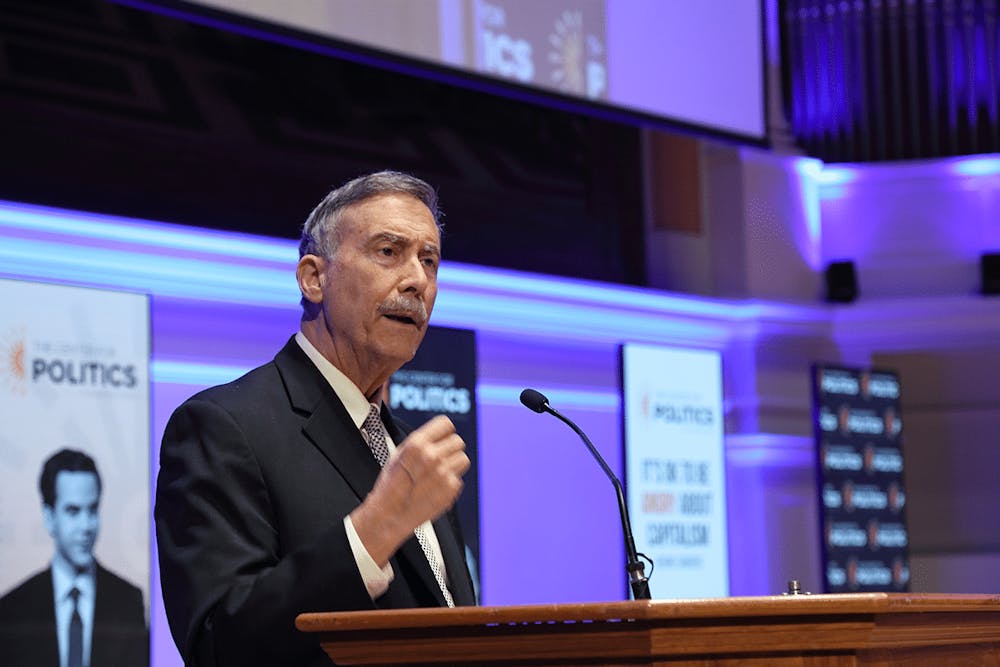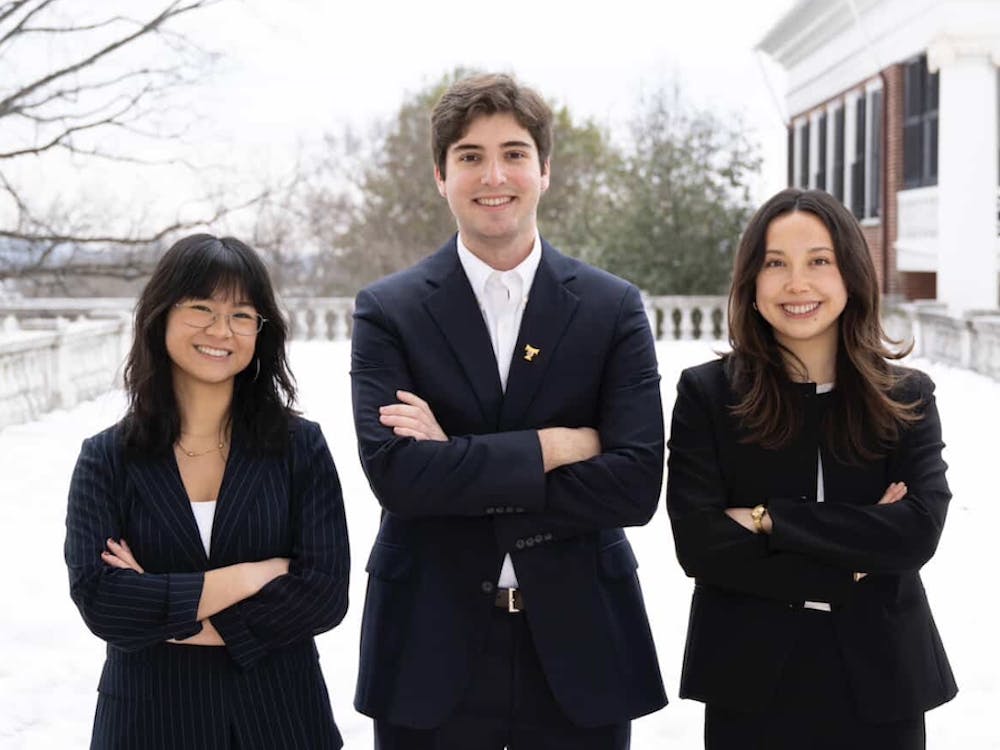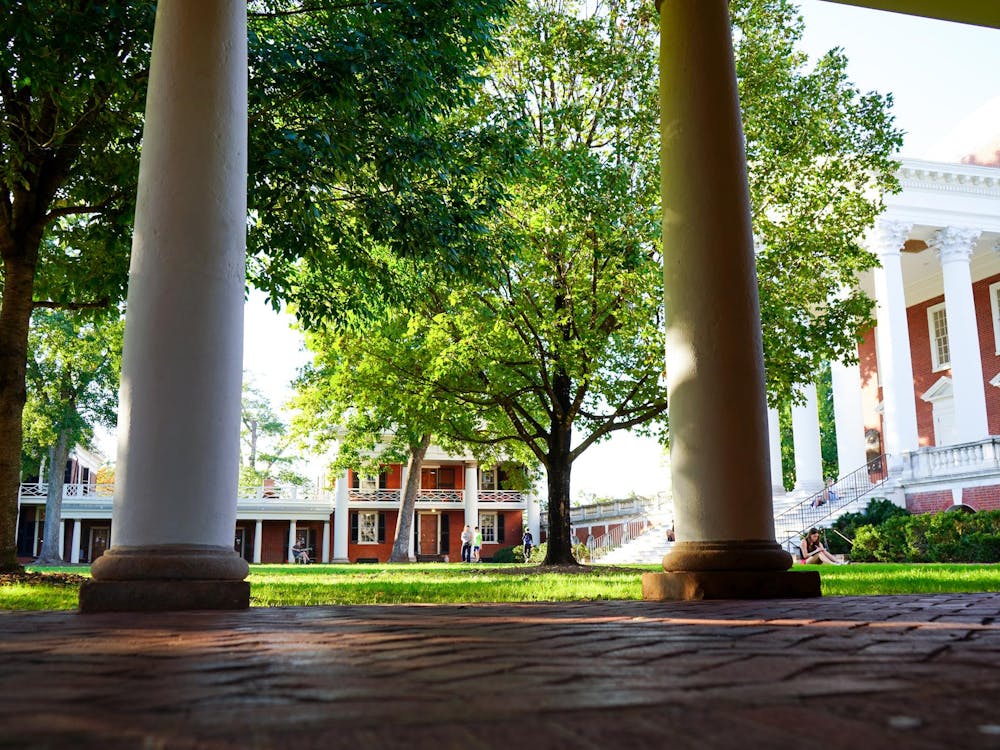With a little over one week until the presidential election, many forecasters depict the election as a dead heat between former President Donald Trump and Vice President Kamala Harris in seven key battleground states — Wisconsin, Michigan, Pennsylvania, Arizona, Georgia, Nevada and North Carolina.
Larry Sabato, director of the University’s renowned Center for Politics, also considers the races in these states to be tossups, as he conducts continuous, day-to-day analysis of the polls. However, he provided some insight to The Cavalier Daily into which way he currently thinks each of these states will “tilt,” ahead of the final prediction released by Sabato’s Crystal Ball — a project under the Center that provides nonpartisan election forecasts and analyses of trends in American politics.
According to Sabato, Georgia and Arizona show a lean towards Trump, while Nevada, Wisconsin and Michigan are looking to favor Harris — however, Pennsylvania and North Carolina remain complete tossups.
Sabato’s Crystal Ball is one of the most historically accurate forecasting websites, calling nearly every state correctly in the 2008, 2012 and 2020 presidential contests. And after spending most of his lifetime forecasting, teaching and following politics, Sabato does not sit still during election season, taking the calendar year off from teaching classes to travel and follow the election in-person.
“I do a lot of traveling, because there's no substitute for seeing people in person,” Sabato said.
And in the nearly eight months that have passed since Sabato spoke to The Cavalier Daily about the 2024 presidential election, dramatic changes in the race for the White House have kept Sabato busy. In February, Sabato said that polls showing President Joe Biden trailing former President Donald Trump would likely change by the election.
Indeed, after Biden decided he would not seek reelection, polls now show Democratic nominee Harris slightly ahead nationally and leading — albeit within the margin of error — in enough states to win the 270 electoral votes needed to become president.
While the majority of states are very likely to break for one candidate or another, the seven key battleground states have been too close for many forecasters to call. But, after many visits to the battlegrounds and constant poll-checking and news-watching, Sabato said the battlegrounds are not all complete coin-flips.
In recent weeks, Sabato has traveled to several battleground regions, including Asheville, N.C., competitive congressional districts in California, Atlanta, Ga. and Omaha, Neb. — which he said holds the potentially decisive electoral vote.
According to Sabato, Georgia and Arizona, which gave Biden his narrowest victories in 2020 and had previously not voted Democratic since the 1990s, could be leaning towards Trump due to a growth in the portion of middle and upper class Latinos — demographics that he says favor Republicans.
“Nevada and Arizona [have] such a large portion of Latinos, but when you look at where they are and how they have moved economically … many are in the middle or even upper middle class,” Sabato said. “They are not entirely the same as four years ago.”
One possible reason for the increasing number of Latino Americans projected to vote Republican is the growth of Latino Americans’ household incomes prior to the pandemic, during Trump’s presidential administration. Polls from this election cycle have consistently shown both Latino and Black voters moving away from Democrats, even after Harris became the Democratic nominee.
On the other hand, the upper-Midwest battlegrounds of Wisconsin and Michigan may lean slightly toward Harris, according to Sabato. While polls have significantly underestimated Trump’s support in these states during the past two presidential elections, Sabato said that Harris still has an edge.
Sabato also said that Nevada also has a Democratic advantage for being home to the Culinary Union — a union made up of workers in Las Vegas’ culinary industry. Democrats have historically been seen as more supportive of unions than Republicans, and Sabato said the Culinary Union has been very effective in turning out votes for Democrats in the state.
“The Culinary Union always makes Nevada more Democratic than it appears in pre-election polls,” Sabato said. “They are really good at organization and regimentation.”
While Sabato identified tilts for Georgia, Arizona, Nevada, Wisconsin and Michigan, he said Pennsylvania — the state that has the highest likelihood of pushing either candidate over the 270 electoral votes needed to win — and North Carolina are complete tossups.
For North Carolina specifically, Sabato said the impact on voter behavior from Hurricane Helene’s destruction makes the state’s outcome even more of a challenge to predict. Many polling places in North Carolina are closed, and destroyed roads have made it difficult for the mail to be transported, complicating absentee voting.
However, Sabato pointed to gender as one factor that could give Harris an edge in these seemingly unpredictable states. According to Sabato, the “gender gap,” or the difference in voting behavior between men and women, could be a significant factor in the election. Sabato said more women are showing support for Harris and more men are showing support for Trump.
Polls this cycle have shown the largest gender gap in a presidential election in history. An August New York Times/Siena College poll reported a 35 point disparity, with women supporting Harris by a net 21 points and men supporting Trump by a net 14 points. Previously, the largest gender gap in a presidential election was the 2016 election, at 26 points between the two candidates. Though the most recent New York Times poll had the gender gap down to 27 points, this number still marks a record divide.
While Sabato said the gender gap could give Harris an edge — as in recent decades, women have registered to vote at higher rates than men — he said he does not believe the gap will play as large of a role in election results as polling currently shows.
Overall, the movement of the polls this presidential election has given little indication of which candidate will prevail on election day. Since Harris became the Democratic nominee, the polls have hardly moved, despite a presidential debate, a second attempted assassination against one of the candidates and intensifying wars in the Middle East.
Still, according to Sabato, there could be more twists to this election cycle, as presidential campaigns typically have an “October surprise,” or a big piece of news that drops and alters the race in a meaningful way. As the month of October rounds out, Sabato said that voters should follow the news closely over the next few weeks to stay tuned into all developing information in the final stretch before election day. He suggested students read as much as they can — Sabato’s Crystal Ball or otherwise — about the election to stay informed.
“You have to be on the case every day,” Sabato said. “This is not something where you can take two or three hours out of a day and say ‘I've mastered it for today.’ There's no way you can.”
The Center’s professors of practice will also be visiting the University in the coming weeks to speak with students about the election. According to Sabato, civil rights leader Martin Luther King III is slated to visit at some point in the near future, and Sabato said he is working to schedule a visit with former Rep. Liz Cheney, a Republican who recently hit the campaign trail alongside Harris.
After the election, Sabato said he looks forward to resuming a “semi-normal life.”
“I've never had a normal life,” Sabato said. “But I'll have a more normal life once it's over.”







